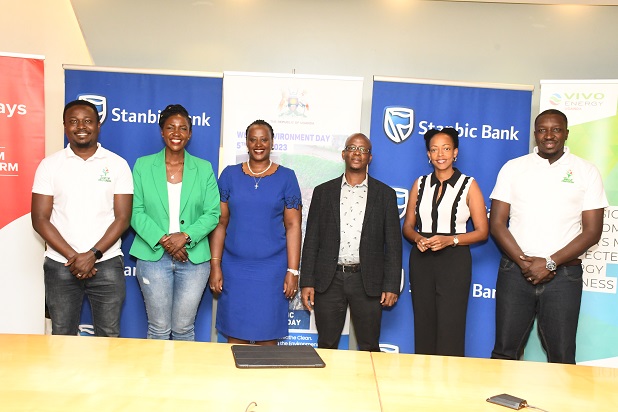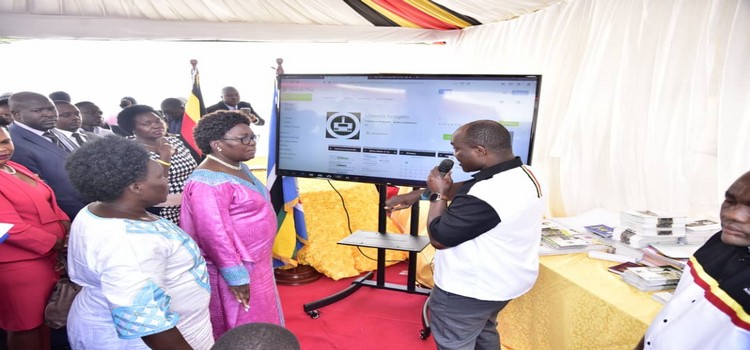Representatives of Taasa Obutonde partners in a group photo
Stanbic Bank Uganda Limited, together with its partners in the Taasa Obutonde campaign will mark the 50th Anniversary of the World Environment Day on June 5 with activities aimed at reducing plastic pollution across Uganda under the hashtag #BeatPlasticPollution.
This year’s World Environment Day theme is “Solutions to Plastic Pollution”. It is a call on world leaders and populations to halt the degradation of ecosystems and restore them. The theme aims to encourage countries to embrace the benefits of a circular plastics economy, educate people on the dangers of plastic usage and providing alternatives to plastic in their daily lives. The ultimate goal is to protect nature, wild and marine life, and making people aware of the importance of recycling and advocating for avoidance of single-use plastic altogether.
The partners seek to promote environmental protection through an Exhibition Conference with players from both the public and private sectors joining behind the National Environment Management Authority (NEMA) to showcase their solutions addressing the environmental concerns of the country.
- This exhibition conference will showcase businesses in Uganda that are transforming the ecosystem by creating innovative solutions that are solving the problem of plastic pollution.
- The conference aims to create an opportunity for the organizations in our society that are finding creative ways to recycle and reuse waste to showcase their ideas to regulators and potential partners to create a circular plastics economy.
Studies estimate that in Uganda, an average of 1,500 tonnes of plastic waste is generated daily, with only 500 tonnes properly managed. This indicates a collection efficiency of 30%, implying that most of the waste generated is not safely recycled and goes into the environment.
Speaking at the event, Stanbic Bank’s Head of Sustainability, Cathy Adengo said, “Plastic waste remains a growing threat to our environment and communities. As we gear up to celebrate World Environment Day on June 5th, 2023, our aim is to promote sustainable waste management of plastics to reduce pollution in our eco-systems. This is line with our commitment as Stanbic Bank to drive sustainable development and support climate a change initiatives that will protect our environment.”
She said the international community is now obligated to curb greenhouse gas emissions caused by plastic, which statistics indicates could account for 19% of the Paris Agreement’s total allowable emissions in 2040.
“Stanbic supports waste management initiatives in communities and our aim is to work together with all partners in the private and public sector to encourage responsible plastic waste management through the three Rs- Reduce, Reuse and Recycle,” she said.
The Taasa Obutonde partners are using their various platforms to sensitise the public on pollution, proper plastic waste segregation and recycling while working with other stakeholders to develop a national alliance for plastic recycling.
Adengo said, “As strong advocates of the UN Sustainable Development Goals, the Bank aims to do business the right way which means being aware of the indirect impact of our actions onto the societies we operate and future generations. If we want to preserve the environment we operate in, we must act now.”
According to the NEMA Executive Director Barirega Akankwasah, NEMA has embarked on a sensitisation campaign about the dangers of single use plastics and the need to shun them. The National Environment Act, 2019, under section 76 (1) prohibits the importation, export, local manufacture, use or re-use of categories of plastic carrier bags or plastic products made of polymers of polythene or polypropylene below thirty (30) microns.
Statistics from NEMA show that plastics take a lion’s share of this waste with over 600 tonnes being produced every day throughout the country. Given that only 40% of this waste is collected and disposed of properly, the remaining 60% finds its way into the environment leading to a number of problems.
He said, “At 60%, plastics constitute the greatest part of pollution of our lakes, rivers, degradation of our soils and rendering fertility and productivity of agriculture ineffective. Needless to say, the rampant blockage of our drainage channels is culminating into the floods that we see today.”
Akankwasah said, “This plastic waste comes along with pathogens which find their way into the food chain like the fish, crops we eat and everything we get from the soil. This is because of irresponsible disposal.”
He said, “This year, we are joining the global effort to #beatplasticpollution. Half of the tons of plastic produced each year are designed to be used only once and less than 10% of that plastic is recycled. This is a percentage we can and will increase, starting with innovators in our own back yard.”
The event will also give an opportunity for organizations to exhibit creative ways to recycle and reuse waste and perhaps spark the interest of regulators and potential partners to drive the circular plastics economy.
Vivo Energy Uganda’s Corporate Communications Manager Val Oketcho said: “It has been proven that irresponsible use and disposal of plastics has far-reaching environmental and health risks to human and animal life. The WED exhibition will sensitize Ugandans about these dangers, create awareness about the safe disposal of plastics, aim to drive behavioural change on the use of plastics and suggest co-existing alternatives for daily use.”
Vivo Energy distributes Shell products and Oketcho said, “Clearly, we have a direct responsibility for the impact that Vivo Energy, products, services, practices, and policies that reduce our impact on the environment. We also have a responsibility to educate local communities and help them adopt behaviours that will safeguard the environment and improve energy efficiency and, consequently, promote both a better quality of life and a sustainable makes as a business, and we work hard to develop energy resources future for individuals and businesses alike.”
Juliana Kagwa, the Corporate Relations Director, Uganda Breweries Limited said: “We all have a responsibility to restore the natural world on which life depends. At Uganda Breweries, we are doing our bit by eliminating waste from our value chain, collaborating with farmers to regenerate landscapes, and creating innovative solutions to grow sustainably. By 2030, we aim to achieve zero waste in our direct operations and zero waste to landfill throughout our supply chain. Similarly, 100% of our packaging will be widely recyclable with at least 60% made from recyclable material.”
According to NBS TV’s Chief Marketing Officer Edwin Danze, said the television station will stream the day’s event live and on its mobile platform.
Danze said a number of organizations are currently operating in the environment conservation space and the focus will be on innovators and private sector companies working on waste management, recycling, solar lighting, innovative alternative solutions, paper production companies’ green energy generation: biomass energy companies, green Art: Young artists innovating in Green Art, Green Real Estate: Architects and interior designers, among others.





